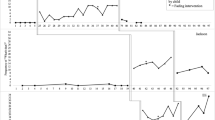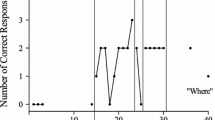Abstract
In the present study, a concurrent multiple baseline design across participants was used to evaluate the efficacy of pivotal response treatment (PRT) on the acquisition, maintenance, and generalization of the question-asking initiations by four children with autism spectrum disorder (ASD). The researchers also examined whether the implementation of PRT resulted in collateral changes in language development and other areas of development. The results of this study indicate that PRT is highly effective in teaching question-asking initiations. Participating children with ASD were able to generalize in natural settings and maintain long-term question-asking initiations. Furthermore, PRT resulted in positive collateral changes in language and other areas of development. Implications for future research and practice are then discussed.





Similar content being viewed by others
References
Acarlar, F., & Johnston, J. (2010). Turkish-SALT: Computer assisted language sample analysis. Communication disorders in Turkish (pp. 119–136). Bristol: Multilingual Matters.
Creswell, J. W., & Creswell, J. D. (2017). Research design: Qualitative, quantitative, and mixed method approaches (5th ed.). London: SAGE.
Doggett, R. A., Krasno, A. M., Koegel, L. K., & Koegel, R. L. (2013). Acquisition of multiple questions in the context of social conversation in children with autism. Journal of Autism and Developmental Disorders, 43(9), 2015–2025. https://doi.org/10.1007/s10803-012-1749-8.
Dotto-Fojut, K. M., Reeve, K. F., Townsend, D. B., & Progar, P. R. (2011). Teaching adolescents with autism to describe problem and request assistance during simulated vocational tasks. Research in Autism Spectrum Disorders, 5(2), 826–833. https://doi.org/10.1016/j.rasd.2010.09.012.
Fredeen, R. M. (2005). Increasing initiations towards peers in children with autism using pivotal response training and collateral gains in quality of initiations. Unpublished doctoral dissertation. Santa Barbara: University of California.
Guven, S., & Topbas, S. (2015). Erken dil gelişimi testi-Üçüncü versiyonu’nun (Test of Early Language Development-Third Edition) Türkiye’ye uyarlama geçerlik ve güvenirlik ön çalışması. International Journal of Early Childhood Special Education, 6(2), 151–172.
Harper, C. B., Symon, J. B. G., & Frea, W. D. (2008). Recess is time in: Using peers to improve social skills of children with autism. Journal of Autism and Developmental Disorders, 38(5), 815–826. https://doi.org/10.1007/s10803-007-0449-2.
Huskens, B., Verschuur, R., Gillesen, J., Didden, R., & Barakova, E. (2013). Promoting question-asking in school-aged children with autism spectrum disorders: Effectiveness of a robot intervention compared to a human-trainer intervention. Developmental Neurorehabilitation, 16(5), 345–356. https://doi.org/10.3109/17518423.2012.739212.
Kazdin, A. E. (2011). Single-case research designs: Methods for clinical and applied settings. New York: Oxford University Press.
Koegel, L. K., Koegel, R. L., Hurley, C., & Frea, W. D. (1992). Improving social skills and distruptive behavior in children with autism through self-management. Journal of Applied Behavior Analysis, 25(2), 341–353. https://doi.org/10.1901/jaba.1992.25-341.
Koegel, R. L., & Koegel, L. K. (1995). Teaching children with autism: Strategies for initiating positive interactions and improving learning opportunities. Baltimore, MD: Paul H Brookes Publishing.
Koegel, L. K., & Koegel, R. L. (2006). Pivotal response treatments for autism communication, social, & academic development. Baltimore: Paul H. Brookes Publishing Co.
Koegel, R. L., & Koegel, L. K. (2012). The PRT Poket Guide, pivotal response treatment for autism spectrum disorders. Baltimore: Paul H. Brookes Publishing Co.
Koegel, L. K., Camarata, S. M., Valdez-Menchacai, M., & Koegel, R. L. (1997). Setting generalization of question-asking by children with autism. American Journal on Mental Retardation, 102(4), 346–357. https://doi.org/10.1352/0895-8017.
Koegel, L. K., Koegel, R. L., Harrower, J. K., & Carter, C. M. (1999a). Pivotal response intervention I: Overview of approach. The Journal of the Association for Persons with Severe Handicaps, 24(3), 174–185. https://doi.org/10.2511/rpsd.24.3.174.
Koegel, L. K., Koegel, R. L., Shoshan, Y., & McNerney, E. (1999b). Pivotal response intervention II: Preliminary long-term outcome data. The Journal of the Association for Persons with Severe Handicaps, 24(3), 186–198. https://doi.org/10.2511/rpsd.24.3.186.
Koegel, L. K., Carter, C. M., & Koegel, R. L. (2003). Teaching children with autism self-initiations as a pivotal response. Topics in Language Disorders, 23(2), 134–145.
Koegel, L. K., Koegel, R. L., Green-Hopkins, I., & Barners, C. C. (2010). Brief report: Question-asking and collateral language acquisition in children with autism. Journal of Autism and Developmental Disorders, 40(4), 509–515. https://doi.org/10.1007/s10803-009-0896-z.
Koegel, R. L., Bradshaw, J. L., Ashbaugh, K., & Koegel, L. K. (2014a). Improving question-asking initiations in young children with autism using pivotal response treatment. Journal of Autism and Developmental Disorders, 44(4), 816–827. https://doi.org/10.1007/s10803-013-1932-6.
Koegel, L. K., Park, M. N., & Koegel, R. L. (2014b). Using self-management to improve the reciprocal social conversation of children with autism spectrum disorder. Journal of Autism and Developmental Disorders, 44(5), 1055–1063. https://doi.org/10.1007/s10803-013-1956-y.
Mohammadzaheri, F., Koegel, L. K., Rezaei, M., & Rafiee, S. M. (2014). A randomized clinical trial comparison between pivotal response treatment (PRT) and adult-driven applied behavior analysis (ABA) intervention on disruptive behaviors in public school children with autism. Journal of Autism and Developmental Disorders, 44(11), 2769–2777. https://doi.org/10.1007/s10803-014-2137-3.
Newman, B., & Eyck, P. T. (2005). Self-management of initiations by students diagnosed with autism. Analysis of Verbal Behavior, 21(1), 117–122.
Ostryn, C., & Wolfe, P. S. (2011). Teaching preschool children with autism spectrum disorders to expressively discriminate between “What’s that?” and “Where is it?” Focus on Autism and Other Developmental Disabilities, 26(4), 195–205. https://doi.org/10.1177/1088357611421504.
Palmen, A., Didden, R., & Arts, M. (2008). Improving question asking in high functioning adolescents with autism spectrum disorders: Effectiveness of small-group training. Autism, 12(1), 83–98. https://doi.org/10.1177/1362361307085265.
Parker, R. I., Vannest, K. J., Davis, J. L., & Sauber, S. B. (2011). Combining nonoverlap and trend for single-case research: Tau-U. Behavior Therapy, 42(2), 284–299. https://doi.org/10.1016/j.beth.2010.08.006.
Rakap, S. (2015). Effect sizes as result interpretation aids in single-subject experimental research: Description and application of four nonoverlap methods. British Journal of Special Education, 42(1), 11–33. https://doi.org/10.1111/1467-8578.12091.
Roberts, J. A., Rice, M. L., & Tager-Flusberg, H. (2004). Tense marking in children with autism. Applied Psycholinguistics, 25(3), 429–448. https://doi.org/10.1017/S0142716404001201.
Roy-Wsiaki, G., Marion, C., Martin, G. L., & Yu, C. T. (2010). Teaching a child with autism to request information by asking “What?” Developmental Disabilities Bulletin, 38(1), 55.
Taylor, B. A., & Harris, S. L. (1995). Teaching children with autism to seek information-acquisition of novel information and generalization of responding. Journal of Applied Behavior Analysis, 28(1), 3–14. https://doi.org/10.1901/jaba.1995.28-3.
Temel, F., Ersoy, O., Avcı, N., & Turla, A. (2004). Gazi erken çocukluk gelişimi değerlendirme aracı “GEÇDA” (Gazi Early Childhood Development Assessment Scale). Ankara: Remay Ltd.
The National Professional Development Center on Autism Spectrum Disorders (NPDC). (2014). What are the evidence-based practice http://autismpdc.fpg.unc.edu/evidence-based-practices (Erişim tarihi: 01.02.2017)
Turan, Y., & Erbas, D. (2010). Social validation in special education. The Journal of International Social Research, 3(10), 605–612.
Ventola, P., Friedman, H. E., Anderson, L. C., Wolf, J. M., Oosting, D., Foss-Feig, J., et al. (2014). Improvements in social and adaptive functioning following short-duration PRT program: A clinical replication. Journal of Autism and Developmental Disorders, 44(11), 2862–2870. https://doi.org/10.1007/s10803-014-2145-3.
Verschuur, R., Huskens, B., Verhoeven, L., & Didden, R. (2017). Increasing opportunities for question-asking in school-aged children with autism spectrum disorder: Effectiveness of staff training in pivotal response treatment. Journal of Autism and Developmental Disorders, 47, 490–505. https://doi.org/10.1007/s10803-016-2966-3.
Vershuur, R., Didden, R., Lang, R., Sigafoos, J., & Huskens, B. (2014). Pivotal response treatment for autism spectrum disorders: A systematic review. Journal of Autism and Developmental Disorders, 1(1), 34–61. https://doi.org/10.1007/s40489-013-0008-z.
Volkmar, F. R., Lord, C., Bailey, A., Schultz, R. T., & Klin, A. (2004). Autism and pervasive developmental disorders. Journal of Child Psychology and Psychiatry, 45(1), 135–170. https://doi.org/10.1046/j.0021-9630.2003.00317.x.
Wert, B. Y., & Neisworth, J. T. (2003). Effects of video self-modeling on spontaneous requesting in children with autism. Journal of Positive Behavior Interventions, 5(1), 300–305. https://doi.org/10.1177/10983007030050010501.
Westling, D. L., & Fox, L. (2004). Teaching students with severe disabilities. Englewood Cliffs, NJ: Prentice Hall.
Yoder, P. J., Spruytenburg, H., Edwards, A., & Davies, B. (1995). Effect of verbal routine contexts and expansions on gains in the mean length of utterance in children with developmental delays. Language, Speech, and Hearing Services in Schools, 26(1), 21–32. https://doi.org/10.1044/0161-1461.2601.21.
Acknowledgments
The authors thank Dr. Sezgin Vuran for their help in social validity data collection. The first author completed this study in the requirements for a Ph.D. dissertation in special education at Anadolu University, Eskisehir, Turkey.
Funding
This work was supported by Anadolu University Scientific Research Projects Commission, Turkey [Grant No. 1307E280].
Author information
Authors and Affiliations
Contributions
GB-G conceived the project, designed the study, conducted the study, collected the data, prepared the data set, analyzed the data, and wrote the manuscript. SY-O was mostly in an evaluative role. In all of the research process, she has peer-controlled, supervised the project, analyzed the data, drew the graphs, wrote and edited the manuscript in English.
Corresponding author
Ethics declarations
Conflict of interest
The authors declare that they have no conflict of interest.
Ethical Approval
The study was approved by the ethics board of the Anadolu University (reference no: 28821/29.01.2016).
Informed Consent
Informed consent was obtained from all individual participants’ parents included in the study.
Additional information
Publisher's Note
Springer Nature remains neutral with regard to jurisdictional claims in published maps and institutional affiliations.
Rights and permissions
About this article
Cite this article
Bozkus-Genc, G., Yucesoy-Ozkan, S. The Efficacy of Pivotal Response Treatment in Teaching Question-Asking Initiations to Young Turkish Children with Autism Spectrum Disorder. J Autism Dev Disord 51, 3868–3886 (2021). https://doi.org/10.1007/s10803-020-04848-y
Accepted:
Published:
Issue Date:
DOI: https://doi.org/10.1007/s10803-020-04848-y




